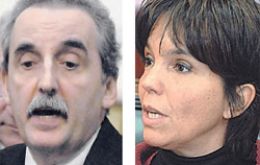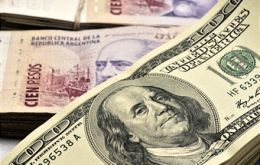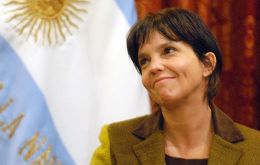MercoPress. South Atlantic News Agency
Tag: Argentine peso
-
Saturday, September 26th 2015 - 09:43 UTC
US dollar in Argentina at an all time record of 16.08 Pesos

The unofficial or 'blue' US dollar exchange rate in Argentina hit an all-time high of 16.08 Pesos at the end of trading on Friday, due in part to policy uncertainty ahead of the October 25 presidential election, according to local market sources.
-
Friday, October 31st 2014 - 08:08 UTC
Chinese relief for Argentina: central banks activate currency-swap

The central banks of Argentina and China on Thursday activated a bilateral currency-swap agreement, which meant that the Argentine central bank received an initial tranche of Yuan equivalent to 814 million dollars.
-
Tuesday, September 23rd 2014 - 10:48 UTC
Argentine Peso faces a turbulent start of the week with new records

The beginning of a turbulent week for Argentina's money exchange market with the informal or 'blue' dollar climbing to 15,15 Argentine Pesos, while the official rate was up one cent to 8,45 Pesos in Buenos Aires banks and foreign exchange offices.
-
Monday, July 14th 2014 - 23:09 UTC
Paraguay's currency steadily becoming a 'strong' currency based on positive indicators

The Paraguayan currency, Guaraní, is expected to revalue 1.4% against the US dollar by the end of the year becoming one Latam's strongest given its positive macroeconomic indicators. This follows a strong performance during the first half of the year when the price of the dollar in the capital Asunción wholesale money exchanges dropped from 4.450 Guaraní to 4.240, according to private consultants “Consensus Economics”.
-
Monday, December 2nd 2013 - 15:22 UTC
Argentine official devaluation of the Peso could reach 50% in the next six months

The Argentine Peso at the official exchange rate could reach a depreciation of almost 50% by the end of the year at the current rate of erosion, which is also expected to have a downward impact on the parallel market or 'blue dollar, according to local experts.
-
Monday, April 29th 2013 - 23:17 UTC
Argentine government considering options to contain the ‘parallel’ dollar

The Argentine government is considering different options to contain the current skyrocketing of the US dollar, but according to the financial media there are different positions in the cabinet of President Cristina Fernandez. One of those calls for direct interventions while the other adopts a more passive attitude saying the issue is speculative and ‘marginal’.
-
Saturday, April 27th 2013 - 04:25 UTC
Argentines fear major devaluation of the Peso and dollar sets new record at 9.34

The US dollar in the ‘blue’ or parallel market kept climbing in Argentina ending a week of consecutive records reaching on Friday 9.30 and 9.34 Pesos (buying and selling price) 14 cents more than on Thursday. Since the beginning of the year the US dollar has climbed 36.97% while the official rate stands at 5.18 Pesos, with an increase of only 5.3%.
-
Thursday, November 1st 2012 - 06:47 UTC
Leading Argentine corporation claims the economy is in ‘very fragile situation”

One of Argentina’ leading international corporations, Techint, made public a 200 pages report sent to the Buenos Aires stock exchange with a devastating picture of the country’s economy which “continues in a state of fragility”.
-
Saturday, July 28th 2012 - 11:21 UTC
Argentine grains futures market in shock: government wants operations in Pesos

Argentina could require that grains futures be listed in the local Peso currency the head of the central bank said on Friday, a move that traders said would paralyze markets in the leading global food supplier.
-
Wednesday, July 18th 2012 - 08:30 UTC
“Informal” and “blue” dollar in Argentina soars to 6.60 and 6.78 Pesos

Argentina's Peso sank in informal trade on Tuesday due to intense demand for US dollars from anxious savers and holidaymakers dodging the government clamp on international currency purchases.
